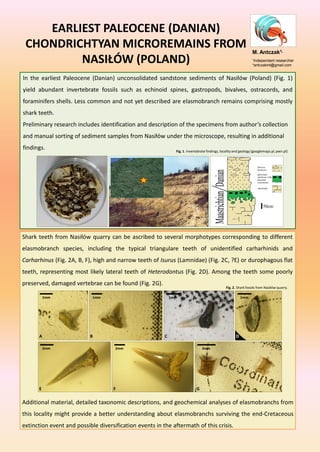Antczak palaeovc2018 poster
- 1. EARLIEST PALEOCENE (DANIAN) CHONDRICHTYAN MICROREMAINS FROM NASI┼ü├ōW (POLAND) M. Antczak1, 1Independant researcher *antczakml@gmail.com In the earliest Paleocene (Danian) unconsolidated sandstone sediments of Nasi┼é├│w (Poland) (Fig. 1) yield abundant invertebrate fossils such as echinoid spines, gastropods, bivalves, ostracords, and foraminifers shells. Less common and not yet described are elasmobranch remains comprising mostly shark teeth. Preliminary research includes identification and description of the specimens from authorŌĆÖs collection and manual sorting of sediment samples from Nasi┼é├│w under the microscope, resulting in additional findings. Shark teeth from Nasi┼é├│w quarry can be ascribed to several morphotypes corresponding to different elasmobranch species, including the typical triangulare teeth of unidentified carharhinids and Carharhinus (Fig. 2A, B, F), high and narrow teeth of Isurus (Lamnidae) (Fig. 2C, ?E) or durophagous flat teeth, representing most likely lateral teeth of Heterodontus (Fig. 2D). Among the teeth some poorly preserved, damaged vertebrae can be found (Fig. 2G). Additional material, detailed taxonomic descriptions, and geochemical analyses of elasmobranchs from this locality might provide a better understanding about elasmobranchs surviving the end-Cretaceous extinction event and possible diversification events in the aftermath of this crisis. 1mm 1mm 1mm 1mm 2mm 2mm 2mm A B C D E F G Fig. 1. Invertebrate findings, locality and geology (googlemaps.pl,pwn.pl) Fig. 2. Shark fossils from Nasi┼é├│w quarry.
